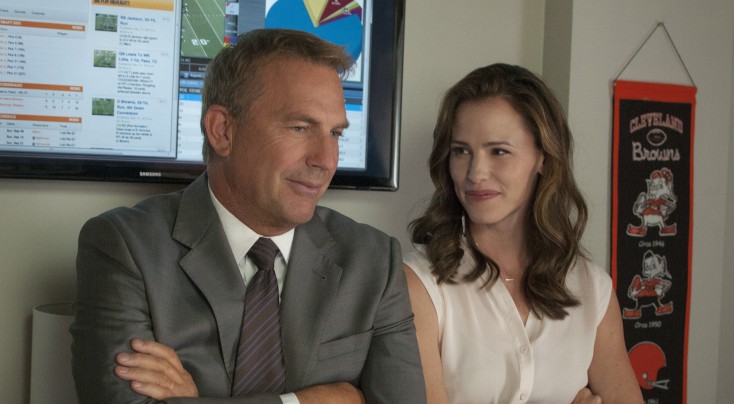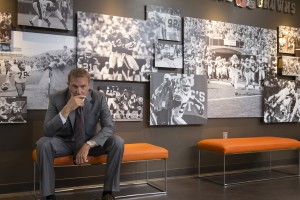By ANGELA DAWSON
Front Row Features
HOLLYWOOD—When you think of Kevin Costner, baseball movies (or maybe westerns) immediately come to mind. The two-time Academy Award winner (“Dances with Wolves”) insists that a really good sports movies really shouldn’t be about the sport.
“You can’t try to impress people with your knowledge, the X’s and O’s, the details and all the technicalities,” warns the 59-year-old actor/director. “You have to make it about people.”
Which is why the actor agreed to star in the Ivan Reitman-directed “Draft Day,” a dramedy about an NFL manager coping with personal and professional pressures on the all-important annual event when professional football teams pick new players from a pool of college hopefuls. Costner plays fictional general manager Sonny Weaver Jr., who hopes to rebuild the team his late father left him by trading one of his players for the No. 1 pick. Sonny’s strategy in wheeling and dealing with other NFL managers to get the player he wants is made even more complicated when he finds himself coming to terms with his girlfriend’s surprise pregnancy announcement and the demands of his mother to attend a memorial for his late dad on that same day. The film also stars Jennifer Garner, Ellen Burstyn and Denis Leary, along with supporting performances by Frank Langella, Sean “Diddy” Combs, Terry Crews, Chadwick Boseman and Rosanna Arquette, plus actual NFL players and well-known sports journalists.
Surprisingly, this is Costner’s first football movie, if that’s what you want to call it. But, to Costner, “Draft Day” is about human relationships like his previous sports movies “Bull Durham,” Field of Dreams” and “For the Love of the Game” were, rather than about the gridiron. Having made a recent big screen comeback this year with roles in the espionage action-drama “Jack Ryan: Shadow Recruit” and the action-thriller “Three Days to Kill,” Costner spoke candidly about his new role and what’s ahead.
Q: There’s a line in the movie where you say, “What do you want?” Is it a reference to “Field of Dreams,” where you at one point said the same line?
Costner: (He laughs.) It’s a thing you have to say to women once in a while. I’m probably speaking for every guy in the world, and maybe that’s why these movies have worked. Sometimes it’s like, “What? Just tell me. What is it you want?” And maybe somebody should ask (men) that, too. It’s such a cool thing in life to get what you want. Most of the time we don’t, but occasionally we do. Sometimes it takes a partner to say, “What is it you want?” Sometimes we don’t know. We’re all in some kind of maze going after the cheese, and at the end (we ask), “What do we want?”
Q: Is that how you felt when you were starting out in show business?
Costner: I just wanted to work when I came to Hollywood. I wanted to get a job. And then I wanted to get a second one. What was it I wanted? Maybe I didn’t want to have to go to work on Monday, have the repetition of the same type of job—not that there’s anything wrong with that. But what is it that I wanted? I knew I didn’t want that. I didn’t mind working 100 Mondays in a row, but I wanted to be done at some point, and I wanted to move on to something fresh, something different. It’s never bothered me to work hard. I’ve probably worked on some of the longest schedules in movie history: “Dances with Wolves” was 108 days, “The Postman” was 113, “Wyatt Earp” was 120 and “Waterworld” was 157 days. They were six-day (work) weeks, and I was directing a couple of those movies. So working hard has never been the problem. What is it you want? That’s a question we all get posed sometimes internally, and sometimes externally. Do you have the answer? So it’s been a pleasure to say those lines in movies.
Q: Did you trust your instinct from the beginning? Has your perspective on who you are and what you bring to your films been based on your instincts?
Costner: Yeah. My whole life has been instinctual for me. I wouldn’t do well in the computer world. My children look at me for an answer, and then they quickly look away because they know that I’m not going to know how to make Super Mario do anything. I want what everybody wants, which is a sense of direction. Right about the time you’re in college, everybody that you run into that knows your parents asks, “Well what’s he going to do?” I finally want to say, “Who gives a ****? It’s not up to you what I do!” I have instinctually thought I could do things in my life, and I’ve followed that up by sometimes putting everything I have at risk—my money, my house—to make a movie. I just did it again with “Black and White,” a little film that I made about the notion of racism in this country and how we have such a difficult time talking about it.
Q: Ostensibly, this film is about the all-important draft day in the NFL, but it’s also about your character finding out he’s going to be a father, right?
Costner: This movie—it’s not about football. It is about that age-old thing of people who love each other but who just can’t seem to get it together for a while, and then they finally do. We adore that. We want that. We make amends, like with my (character’s) mom (played by Burstyn). And I call that guy, “You pancake-eating ************!,”who’s been mean to me. We kind of wish we were Sonny right then. We are kind of glad about what he says to that guy, vulgarity aside. It almost needed the vulgarity because the guy was such a bad winner. Don’t you hate bad winners? That guy was a bad winner and I had to nail him right there at the end. I’m glad that single line didn’t spin this movie into an R (rating), because we see what R’s really are out there. This was a moment that needed all the salt and pepper. Movies can do that, and the difference between movies and our own life is that sometimes in these heated moments we don’t know what to say, and we wish somebody wrote our own script for us.
Q: What do you find creatively exciting and satisfying about storytelling within the sports framework?
Costner: I felt that “Draft Day” had a chance to be an American classic if we stuck with it. I don’t know if it’ll be a box office hit, but I think it can be a classic movie, which, by definition, means it’ll be shared from generation to generation. To me, that’s the mark of a great movie.
Q: How do you deal with pressure?
Costner: I have a tendency to probably be at my best under pressure. I actually play sports better when I’m mad. Some players don’t play better when they’re mad. They lose their sense of where they’re at. I’ve had moments in my life where it was all out on the table, everything I had, because I had a strong believe that what I was doing, other people could believe in it, too, if I can get it just right. So, I have a tremendous belief in people, not that people don’t let me down, and not that I haven’t maybe let people down, but I have a tremendous belief in people and in the common experience.
Q: Director Ivan Reitman said he could hear your voice when he was reading the script by Rajiv Joseph and Scott Rothman script. A few days later, he could place your face with the character. When someone wants you to be in a movie because of who you are and what you’ve done, does that present an extra challenge for you?
Costner: Some people come to you because if you’re in their movie it’ll help them raise money, and some people come to you because they think you’re the person to play the part. I’ve always been distracted when somebody is coming after me and saying, “You’re the only person that can play this part.” Then, if you say you can’t play the part, they cast Jeff Goldblum in the part—Jeff Goldblum is a very very good actor, but we’re different—so if I’m the only person who can play this part, you would think that maybe (they’re lying). I’ve been in a place (as a director) if I couldn’t get somebody to play a part, I wasn’t going to make the movie, so I mean what I’m saying. I like being around people that mean what they say. For Ivan, I think it was about the part, and if there was baggage, he cast it aside. For him, I think it was: Kevin should play the part. Let’s be honest, it’s nice to be wanted in almost any capacity. That’s a good feeling. I’m not immune to it.
Q: Did you have any input in your Sonny character after you got this script?
Costner: Yeah, but it was a really good script. “Pancake-eating ************” was my contribution. (He laughs.)
Q: What’s your favorite sports movie?
Costner: I always liked “The Pride of the Yankees.” I just did. I’m a Walter Brennan (and) Gary Cooper fan.
Q: What was the Draft Day in your career?
Costner: I think getting in “The Big Chill.” That was the moment.
Q: Even though you weren’t in it much?
Costner: I didn’t need to appear in a movie to know that it was a pivotal moment for me. I knew that it was happening, so I looked at it differently.






